18 Sep 2014 | Armenia, Azerbaijan, Azerbaijan News, News, Turkey
On 5 September, Azerbaijaini president Ilham Aliyev addressed the Nato summit at the Celtic Manor golf resort in Newport, Wales.
It was an unspectacular speech from an unspectacular autocrat. As he often does, he talked about the amount of money Azerbaijan was spending abroad, Azerbaijan’s rapid economic development, Azerbaijan’s role as a bridge between east and west, and Azerbaijan’s continuing dispute with Armenia.
The dispute between the two countries over the territory of Nagorno-Karabakh, which has gone on pretty much since the break-up of the Soviet Union, flared as recently as this summer, when fourteen Azerbaijani troops were killed in clashes with their Armenian counterparts. It was easy to miss this, considering events in other parts of the former Soviet Union. As seems usual in international conflict now, neither side made any gain and both sides claimed victory.
A few weeks after that skirmish, and just before his Nato address, Aliyev met recently-elected president (formerly prime minister) Recep Tayyip Erdogan of Turkey. Aliyev is keen to build an alliance with Turkey, and clearly sees common cause in a shared dislike of Armenia. After the meeting, the Azerbaijani leader tweeted that “Turkey has always pursued an open policy on the issue of the Armenian-Azerbaijani conflict over Nagorno-Karabakh, has always stood by Azerbaijan, stood by truth, justice and international law.” He went on:
This was interesting, in that Erdogan did not seem to mention any discussion of the Armenian genocide in his press briefing after the meeting. In fact, the Turkish president has been perceived as attempting to soften the Turkish state’s hardline denial of the incidents of 1915, when one million Armenians suffered deportation and death at the hands of the Ottoman Empire, the predecessor of modern Turkey.
In April, on the 99th anniversary of the beginning of the ethnic cleansing of Armenians, Erdogan released a statement saying: “Millions of people of all religions and ethnicities lost their lives in the first world war. Having experienced events which had inhumane consequences – such as relocation – during the first world war should not prevent Turks and Armenians from establishing compassion and mutually humane attitudes towards one another.”
The Justice and Development (AK) party leader went on to express condolences to the descendants of people who had died “in the context of the early 20th century”.
Now, this isn’t quite an apology; it’s barely even an apology at upset caused. It’s closer to the “mistakes were made” formulation, which is designed not so much to pass the buck as fire the buck into the heart of the sun in the hope that no one will ever have to deal with it again, particularly not the person whose buck it is in the first place.
But in the context of Turkey, where not long ago talking about the Armenian genocide could get you killed, it’s as good as you’re going to get for now.
So why would Aliyev raise the genocide issue this month? Perhaps he is nervous that Turkey, a major ally in the Nagorno-Karabakh dispute, is going soft on Armenia. This year’s detente between Turkey and Armenia continued when Armenia’s foreign minister Eduard Nalbandian attended Erdogan’s presidential inauguration at the end of August.
Nalbandian, in return, formally offered Erdogan an invitation to Armenia’s genocide commemorations next year, repeating an invitation first extended a few months ago by the country’s president Serzh Sargsyan. Any newfound good relations between Armenia and Turkey would severely weaken Azerbaijan’s territorial argument, or more accurately, weaken its ability to make the argument forcefully in the international arena. Turkey’s dispute with Armenia, after all, is mainly historic, and Erdogan, having seemingly consolidated his own power base outside of both the secular “deep state” and the Islamic Gülen movement to which many assumed he owed his success, now has a free hand on shaping foreign policy. Azerbaijan’s dispute with Armenia is current and, Aliyev hopes, immediate.
And so Azerbaijan has chosen to try to reignite the issue for its own ends. Meanwhile, in his own country, human rights abuses continue, with reports last week that Leyla Yunus, Director of the Institute for Peace and Democracy, was in ill health after prison beatings.
In spite of all this, Azerbaijan will continue to attempt to buy respectability. Next June, Baku will hold the first “European Games”, backed by the European Olympic Committee, featuring such irrelevancies as three-a-side basketball and beach soccer. It is not exactly the real thing, but then, post-Soviet Azerbaijan is a country built of facades; facades of modernity and wealth and progress and “democracy”. Facades that hide an underlying ugliness.
This article was posted on Thursday 18 Sept 2014 at indexoncensorship.org
8 Aug 2014 | Azerbaijan, Azerbaijan News, Europe and Central Asia, News
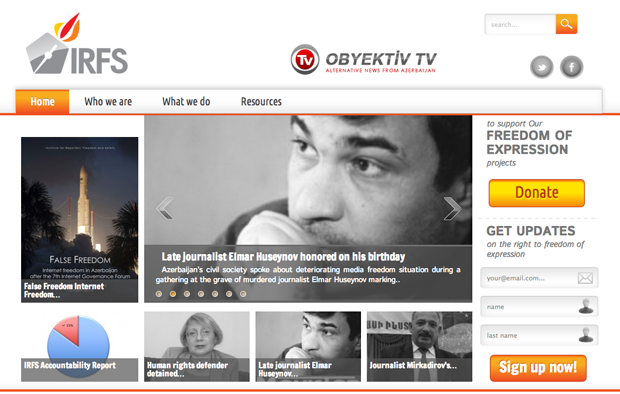
(Image: IRFS)
The offices of Azerbaijani press freedom organisation Institute for Reporters’ Freedom and Safety (IRFS) were on Friday searched by police – the latest in a new clampdown by authorities on human rights groups in Azerbaijan. Human rights lawyer Intigam Aliyev also had his home searched, and has been sentenced to three months pretrial detention.
The IRSF offices were today surrounded by police officers according to reports from Azerbaijan. There are unconfirmed reports that Emin Huseynov, the head of the organisation, has been detained. He was already under a travel ban.
Over the past two weeks, human right defenders Leyla and Arif Yunus and Rasul Jafarov have been sentenced to three months of pretrial detention, facing charges including high treason, state betrayal and tax evasion. One of the country’s few remaining independent newspapers, Index Award winner Azadliq, has been forced to suspend publication due to financial troubles.
IRFS has been reporting on these and other instances of apparent state targeting of opposition voices. The NGO was founded in 2006, “in response to growing government restrictions on freedom of expression and freedom of press,” according to their mission statement. The latest global press freedom index from Reporters Without Borders ranks Azerbaijan at 160 out of 180 countries, and the recent estimates puts the number of political prisoners in the country at over 140.
The recent cases have taken place against a backdrop of heightening tensions between Azerbaijan and neighbouring Armenia, which so far has left at least 14 people dead. President Aliyev on Thursday published a series of tweets on his personal Twitter account which seemed to threaten war with Armenia. The troubled relationship between the two countries has also played a part in cases against dissidents, including Leyla Yunus who has been accused of spying for Armenia.
In May, Azerbaijan assumed chairmanship of the Council of Europe’s (COE) Committee of Ministers, whose tasks include “ensure[ing] that member states comply with the judgments and certain decisions of the European Court of Human Rights”.
In a statement on Friday, the COE said Secretary General Thorbjørn Jagland has “revealed his deep concern at the arrest of Azerbaijan human rights defender Leyla Yunus and the prosecution case against her husband Arif”.
“By stifling dissent, Azerbaijan is failing to comply with its international obligations which require safeguarding freedom of expression, assembly and association. It is necessary that Azerbaijan reverse the situation,” COE Commissioner for Human Rights Nils Muiznieks has told Azerbaijani media.
Index on Censorship, along with 60 other NGOs, has called for the immediate and unconditional release of Leyla and Arif Yunus and Rasul Jafarov. Today Index reiterates this call and raised its concerns with Britain’s Foreign and Commonwealth Office.
“It is deeply worrying that while international attention is directed at conflicts elsewhere, Azerbaijan appears to be resuming oppression of dissent,” said Jodie Ginsberg, CEO of Index on Censorship. “This is a country showing blatant disregard for human rights while presiding over an institution that describes itself as the continent’s ‘leading human rights organisation.’ The fellow members of the Council of Europe must do more to show Azerbaijan its actions must cease immediately.”
This article was published on August 7, 2014 at indexoncensorship.org
8 May 2014 | Azerbaijan, Azerbaijan News, Europe and Central Asia, News
This week eight young Azerbaijani activists were sentenced to between six and eight years in jail. The members of the N!DA Youth Movement, which works for democracy and social change, were convicted for possession of drugs and explosives, and for intending to “cause public disorder”. The charges are widely believed to be trumped up, and the trials have been criticised by foreign observers over “irregularities” and “shortcomings”, including inconsistencies in testimonies and mishandling of evidence.
This is just the latest addition to a long list of human rights abuses by authorities in the oil rich country. As the repression has largely been allowed to take place away from international attention, this is a good moment to remember a few things about Azerbaijan, especially as the country prepares to take over a six month chairmanship of the Council of Europe’s Committee of Ministers.
1) The six are far from the only political prisoners in Azerbaijan
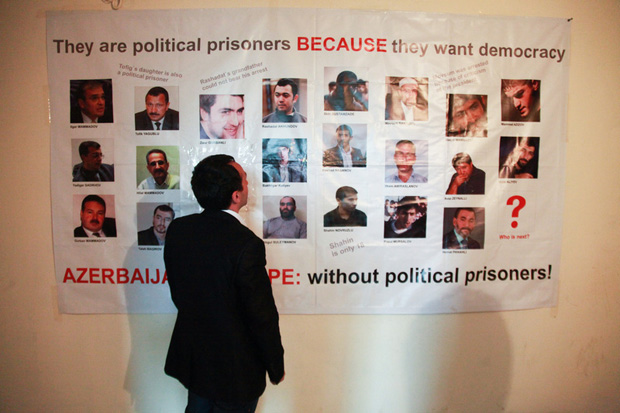
(Image: Aziz Karimov)
According to the latest figures, there are 142 political prisoners in Azerbaijan today. These include human rights defenders, youth activists, and a large number of religious activists, among others. There are currently 17 people serving life sentences. Ahead of the country’s presidential election last October, candidate Ilgar Mammadov was arrested. In March, he was sentenced to seven years in prison for “organizing mass disturbances” and “resisting the police”. Meanwhile, President Ilham Aliyev insists that there are no political prisoners in Azerbaijan.
2) You may escape imprisonment, but you could still face violence and intimidation
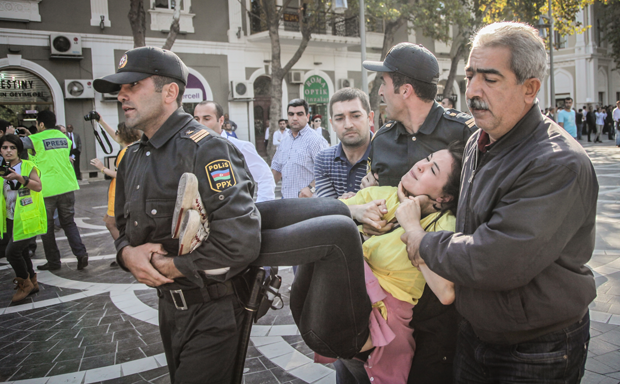
(Image: Aziz Karimov)
Attacks, threats and intimidation are regular occurrences for political opponents, activists and press in Azerbaijan. Following protests in the capital Baku as Aliyev secured his third consecutive term in power last October, demonstrators were beaten and detained by police. Police also raided the offices of independent Election Monitoring and Democracy Studies Centre (EMDSC) which reported irregularities in the election. In 2012, reporter Idrak Abbasov was brutally beaten when filming the demolition of a house by the State Oil Company of Azerbaijan, allegedly by employees of the company and police. The same year, fellow journalist Khadija Ismayilova, known for covering corruption among the country’s powerful elite, was blackmailed with intimate images of her and her boyfriend. She continues to face intimidation today. These abuses are often allowed to happen with impunity.
3) Independent and critical media are under threat

(Image: Alex Brenner for Index on Censorship)
Azerbaijan’s critical press have long been subjected to an array of attacks. Independent news outlets face economic sanctions, and are often barred from distribution networks. Some 70% of distribution is controlled by the government. Most of the nine national TV channels are either directly owned by the state or controlled by the authorities. Journalists also fall victim to legal threats. In the first six months of 2013, 36 defamation suits were brought against media outlets or journalists, four of which were criminal defamation suits. One victim of this hugely restrictive media environment is leading independent paper and Index Award winner Azadliq. The paper has been hit with £52,000 worth of fines following defamation suits, state-owned press distribution company Gasid has not been transferring payments that reflect the paper’s sales. Azadliq claims Gasid owe them some £44,000.
4) Authorities are on an ongoing PR mission
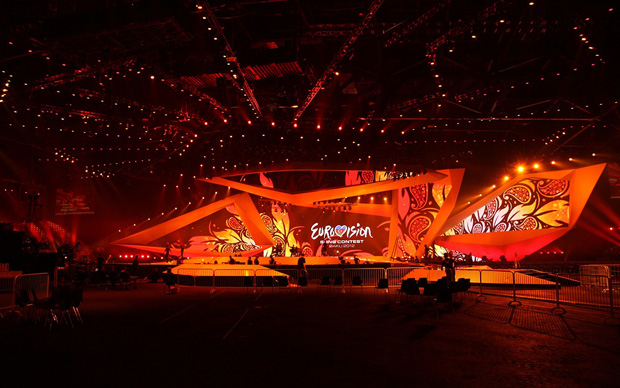
(Image: Zeljko Joksimovic/Wikimedia Commons)
While the situation inside the country shifts between bad and worse, authorities have focused their attentions on a wide-reaching international PR campaign. Ahead of hosting the Eurovision Song Contest, authorities ordered urban renewal that saw houses demolished and families evicted. Vast sums have in recent years been poured into the radical regeneration and beautification of Baku, and there’s more to come. There is also the posh London bar Baku, owned by the Aliyevs; the glossy, internationally distributed Baku magazine, edited by first daughter Leyla and co-published by Conde Nast; and the sponsorship deal with Champions League finalists Atlético Madrid. Next year, Baku will again play host to a prestigious international event — the inaugural European Games.
5) They are about to take charge of one of Europe’s most important human rights bodies
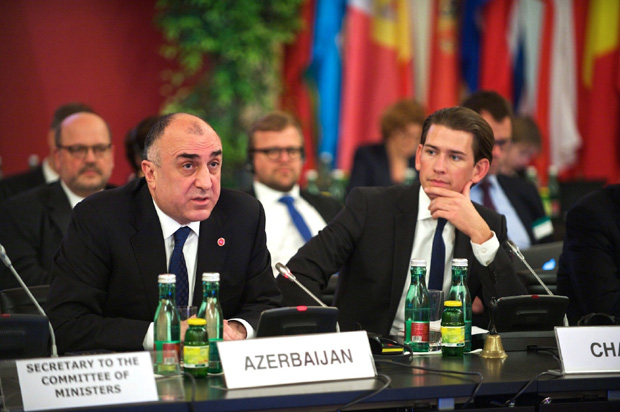
(Image: Sandro Weltin/Council of Europe)
“The Committee of Ministers supervises the execution of judgments of the European Court of Human Rights the Council of Europe…The Committee of Ministers’ essential function is to ensure that member states comply with the judgments and certain decisions of the European Court of Human Rights,” the Council of Europe declare on their website. Next week Azerbaijan will assume the chairmanship of this very Committee of Ministers. But one could say that COE is only sticking to form in its relationship with the country. Only last year, a majority in its Parliamentary Assembly (PACE) voted down a resolution on the existence of political prisoners in Azerbaijan.
This article was originally published on 8 May 2014 at indexoncensorship.org
1 May 2014 | Azerbaijan, Azerbaijan News, Europe and Central Asia, News

Striker Diego Costa during the first leg of Atlético Madrid’s Champions League semi-final against Chelsea (Image: Gonzalez Fuentes Oscar/Demotix)
Atlético Madrid are the toast of world football fans at the moment. They’re having possibly their greatest season ever, qualifying for the Champions’ League Final and looking set to break the Barcelona/Real Madrid duopoly over Spain’s La Liga.
Sports fans love nothing more than an underdog story, and the Atlético one feels just right. Always the less glamorous team in the Spanish capital, they’re finally having their time in the sun. Only a complete killjoy would rain on the parade of super striker Diego Costa and his team mates.
So here I go.
Atlético’s shirts bear the advertising slogan “Azerbaijan: Land of Fire”. They are sponsored by the government of Ilham Aliyev, a man who combines the callousness of the classic dictator with the appearance and language of an aspiring sales executive who’s read one too many management manuals. His Twitter page bears the fascinatingly banal phrase: “We turn initiatives into reality.” I have absolutely no idea what that means (suggestions in the comments, please). Whatever it does mean, he’s clearly quite pleased with it, as it pops up regularly on his website.
The deal (sorry, “strategic agreement”) with Atlético came about in December 2012, and was renewed in March 2014.
The explanatory blurb on the Atlético website is packed with more nonsense of the “initiatives into reality” variety.
Atlético is not a football club, it is a “sports entity”.
“The link between Azerbaijan and Atlético Madrid,” we are told, “is much more than a traditional commercial sponsorship associated with a shirt sponsorship, because it has atremendous value, as the tool to achieve important goals, through actions of a different nature, sports, commercial, communication, marketing and corporate social responsibility for the benefit of all parties.”
This is almost poetic in its nonsense; in fact the “actions of a different nature, sports, commercial, communication, marketing and corporate social responsibility for the benefit of all parties” brings to mind no less literary masterpiece than Lucky’s monologue in Samuel Beckett’s Waiting for Godot: “…the practice of sports such as tennis football running cycling swimming flying floating riding gliding conating camogie skating tennis of all kinds…”
All this would merely be amusing if Aliyev was, say, head of a fleet car dealership in Runcorn. Unfortunately, he’s not. He’s the autocratic head of a regime bloated on oil and gas revenue that is engaged in an enormous whitewashing exercise composed of equal parts propaganda and censorship.
The propaganda part can be quite amusing: the Knightsbride nightclub called Baku, after Azerbaijan’s capital; the glossy magazine, also called Baku; the shiny skyscrapers; the on-message Eurovision Song Contest entry (Start A Fire, sung by Dilara Kazimova).
The censorship bit is rather less fun, as a search on the Index on Censorship website will quickly reveal.
There is the case of journalist Khadija Islamova, harassed and blackmailed by the authorities; Index on Censorship award winning newspaper Azadliq, threatened with financial ruin deliberately brought about by state agencies; Idrak Abbasov, brutally assaulted for daring to report on demolitions of houses by the state oil company. There is also Rafiq Tagi, a murdered columnist whose killer has never been brought to justice; dissident “Donkey bloggers” Adnan Hajizade Emin Milli, imprisoned for hooliganism after going to the police to report that they had been assaulted; reporter Eynulla Fatullayev, jailed for four years, and hit with false drug charges; critical journalist Elmar Huseynov, murdered in 2005.
Are these victims of Atlético Madrid? No, it would be unfair to say that. For a start, Atlético are not the only club to benefit from shirt sponsorship from dubious regimes; Barcelona, with their smug “més que un club” image, ditched UNICEF from their jerseys to sign a deal with Qatar, a country that locks up poets, for God’s sake. No one blames Lionel Messi for the fate of Mohammed al-Ajami.
Nonetheless, Azerbaijan’s deal with Atlético is one side of Aliyev and his cronies’ colossal image management exercise; and the imprisonment of critical reporters, bloggers and activists is the other. They cannot be separated entirely.
We should enjoy the football and praise the players, but we owe it to brave determined Azerbaijainis to ask some tough questions of Atlético’s officials, even as they celebrate.
This article was posted on May 1, 2014 at indexoncensorship.org








